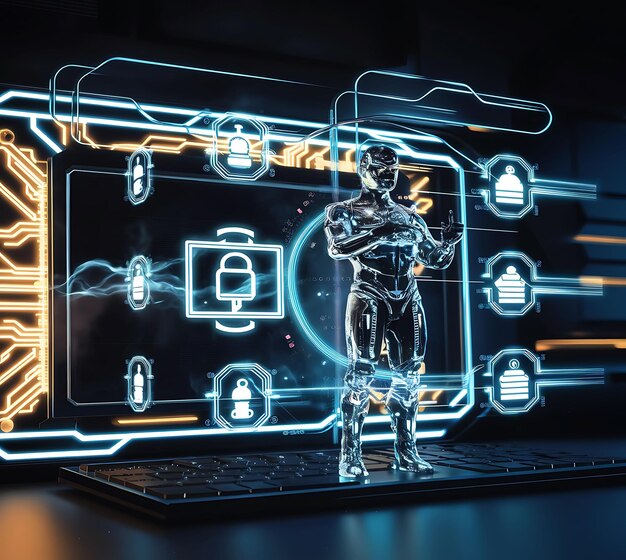Unleashing the Dark Side of AI: How a Trump Presidency Could Pave the Way
The artificial intelligence (AI) revolution is one of the most transformative forces of our time. However, as we continue to advance in this field, it’s essential to consider not only the benefits but also the potential risks and ethical dilemmas. In recent years, there have been growing concerns about the militarization of AI and its potential misuse by authoritarian regimes. Enter the Trump presidency, a controversial figure known for his unconventional approaches and disregard for traditional norms.
Trump’s Controversial Stance on AI
During his presidency, Trump’s administration took a lax approach to regulating AI development and deployment. This was despite growing concerns from experts about the potential misuse of this technology, particularly in areas like military applications and privacy invasions.
Militarization of AI
Military AI research and development under the Trump administration received significant funding and support, leading to advancements in areas such as autonomous weapons systems and surveillance technologies.
Privacy Concerns
The Trump administration’s approach to privacy regulations was also lackluster, leading to a widespread erosion of individual rights and raising concerns about the potential misuse of AI for surveillance and data collection.
The Dark Side of AI: Dangers and Ethical Considerations
The potential dark side of AI is a growing concern for many experts. The militarization and misuse of this technology can lead to unintended consequences, including escalating conflict, increased surveillance, and violations of human rights.
Conclusion: Preventing the Dark Side of AI
As we continue to explore and develop the potential of AI, it’s crucial that we remain vigilant about the risks and ethical considerations. The Trump presidency‘s lax approach to regulation served as a warning sign of what could happen if we fail to address these concerns. It’s essential that governments and organizations work together to establish robust regulations, guidelines, and ethical frameworks to ensure that AI is used in a responsible and beneficial manner.

Artificial Intelligence: A Game Changer under a Trump Presidency
Artificial Intelligence, or AI, refers to the development of computer systems able to perform tasks that would normally require human intelligence. These include learning, problem-solving, understanding language, recognizing patterns, and making decisions based on data. AI is no longer a futuristic concept but has become an integral part of our daily lives, from voice-activated assistants and recommendation engines to self-driving cars and medical diagnosis tools. However, as AI continues to evolve at an unprecedented pace, it is essential to consider its potential impact on society.
Impact of AI under a Trump Presidency
The incoming Trump presidency could significantly influence the development and application of AI in ways that raise ethical, security, and societal concerns. On the one hand, a business-friendly administration might accelerate the adoption of AI technologies in various industries, leading to increased productivity and economic growth. However, on the other hand, there are potential risks that should not be overlooked.
Ethical Concerns
One of the most pressing ethical concerns is AI’s impact on employment, particularly in industries where tasks can be automated. While some argue that AI will create new jobs, others warn of mass unemployment and the need for a universal basic income to ensure social stability. Additionally, there are concerns about bias in AI systems, which could exacerbate existing social inequalities and lead to discrimination against marginalized communities.
Security Concerns
Another area of concern is the security implications of AI. As AI becomes more sophisticated, it could be used to develop advanced cyber-attacks or even autonomous weapons. The potential misuse of AI in the hands of malicious actors poses a significant threat to national security and global stability.
Societal Concerns
Finally, there are societal concerns related to the impact of AI on privacy and human relationships. With the increasing use of AI in surveillance and data collection, there is a risk of violating individual privacy and potentially infringing upon civil liberties. Moreover, some argue that the widespread use of AI could lead to a loss of human connection and empathy, ultimately undermining our social fabric.
Thesis Statement
In conclusion, a Trump presidency could significantly influence the development and application of AI in ways that could potentially lead to its “dark side,” raising ethical, security, and societal concerns. It is essential that these issues are addressed proactively to ensure that AI is developed and used in a manner that benefits society as a whole while minimizing potential risks.
Understanding the Trump Administration’s Stance on AI
The Trump Administration’s stance on Artificial Intelligence (AI) can be examined through a analysis of the President’s past statements and actions related to technology and AI.
Examination of Trump’s past statements and actions
Campaign promises and policy proposals
During his 2016 presidential campaign, Donald Trump made few statements directly related to AI. However, he did emphasize his desire for America to “win again” and to make the country a leader in technology industries, including those related to AI (“America First” Policy). After taking office, the Trump Administration proposed a link in February 2019, which focused on advancing AI research and development, increasing the adoption of AI technologies by industry and government, and ensuring American leadership in this field.
Appointments to key positions
Trump’s appointments to key technology-related positions have also provided insight into his Administration’s stance on AI. Michael Kratsios, a former Google executive, was named as the White House Chief Technology Officer (CTO) in 2017. While in this role, Kratsios has emphasized the importance of AI and technology innovation for economic growth and national security (“American Innovation”).
Analysis of the potential implications of these stances for AI development and regulation
The Trump Administration’s stance on AI can be further understood by considering the potential implications of these positions for AI development and regulation.
Privatization and deregulation of technology sectors
The emphasis on increasing the adoption of AI technologies by industry and reducing regulation in the tech sector (“Technology Sector Consolidation”) could lead to a rapid expansion of AI applications, but also raises concerns about potential negative consequences, such as job displacement and privacy violations. The Administration’s stance on deregulation may result in a lack of oversight for AI systems, allowing the technology to develop without proper safeguards and ethical considerations.
National security concerns and potential implications for AI applications
The Trump Administration has also expressed concerns about the potential national security risks posed by AI and other emerging technologies. This focus on security could result in increased funding for research and development of military AI applications (“Military AI Development”), as well as efforts to address potential threats posed by foreign actors in this domain. However, it is important to consider the ethical implications of using AI for military purposes and the potential unintended consequences that could result from such applications.

I Ethical Concerns: The Dark Side of AI under a Trump Administration
Exploration of ethical issues
surrounding the development and deployment of AI, particularly in the context of a Trump presidency:
Bias and Discrimination in AI Systems
Historical examples and current trends: Bias and discrimination have long been a concern in technology, with historical examples like the link leading to gender imbalance in tech industries. In the context of AI, this issue persists; for instance, facial recognition technology has been found to be less accurate for people with darker skin tones. The potential impact of a Trump administration’s policies on bias and discrimination in AI: Under the Trump administration, some policies may exacerbate these issues. For example, his stance against affirmative action could lead to a lack of diversity in AI development teams, potentially resulting in biased systems that unfairly disadvantage certain groups.
Privacy Concerns and Data Security
Trump’s stance on privacy and data protection: During his presidency, Trump has shown a disregard for privacy and data protection through actions like rescinding Obama-era protections for internet users’ privacy. Potential implications for AI development and application: This lack of regard for privacy could lead to the deployment of invasive AI systems that infringe upon individuals’ rights. Furthermore, insecure data handling practices could result in sensitive information being leaked, putting users at risk.
The Impact of a Trump Presidency on the Ethical Governance of AI
Regulatory frameworks and oversight bodies: Trump’s policies could weaken or eliminate existing regulatory frameworks governing AI, potentially allowing unchecked development and application of the technology. The role of international organizations and cooperative efforts in regulating AI ethics: International cooperation is crucial for establishing ethical guidelines for AI. However, under a Trump presidency, the United States’ participation in these efforts may be diminished or even withdrawn entirely, leaving a regulatory vacuum that could lead to unethical uses of AI.

Security Concerns: National Security Implications of AI during a Trump Presidency
Discussion of national security concerns surrounding AI and their potential implications under a Trump administration
Artificial Intelligence (AI) has emerged as a transformative technology with the potential to revolutionize various sectors, including defense and national security. However, its rapid advancement also raises significant security concerns that need to be addressed, particularly under the Trump administration.
Cybersecurity threats and vulnerabilities in AI systems
AI systems are increasingly being integrated into critical infrastructure, including power grids, transportation networks, and communication systems. However, this integration also creates new vulnerabilities that could be exploited by adversaries. For instance, cyber attacks targeting AI systems could cause widespread damage and disrupt essential services. Historically, we have seen numerous examples of such attacks, including the Stuxnet worm that targeted Iran’s nuclear program in 2010 and the more recent WannaCry ransomware attack that affected over 200,000 computers in 150 countries.
1.Historical examples of cyber attacks targeting critical infrastructure and data breaches
The Stuxnet worm, which was discovered in 2010, is considered to be the first known cyber weapon. It targeted Iran’s nuclear program by manipulating the centrifuges used in uranium enrichment. The worm was so sophisticated that it went undetected for years, causing significant damage to the Iranian nuclear program. More recently, in 2013, the Snowden revelations exposed massive data breaches by the National Security Agency (NSA), raising concerns about privacy and security.
1.Trump’s stance on cybersecurity and potential implications for AI security
The Trump administration has taken a tough stance on cybersecurity, with the President signing an executive order in May 2017 that aimed to strengthen the nation’s cyber defenses. However, the administration’s focus on border security and immigration may divert resources away from cybersecurity efforts, leaving AI systems vulnerable to attacks.
Potential use of AI in military applications and their ethical and strategic considerations
AI is also being explored for use in military applications, including autonomous weapons systems and drones. While these technologies offer significant benefits, they also raise ethical and strategic considerations.
2.Autonomous weapons systems and drones
Autonomous weapons systems, also known as lethal autonomous robots (LARs), have the potential to revolutionize warfare by reducing the need for human casualties. However, they also raise ethical concerns about accountability and the potential for unintended consequences. For instance, an autonomous weapons system could mistakenly target civilians or friendly forces, leading to unintended casualties and damage.
2.Surveillance technologies and potential privacy concerns
AI-powered surveillance technologies, such as facial recognition systems and predictive policing algorithms, offer significant benefits in terms of public safety and national security. However, they also raise privacy concerns, particularly in the context of mass surveillance and potential misuse of data. The Trump administration’s stance on privacy, which has been lax to say the least, could exacerbate these concerns and lead to a slippery slope towards an Orwellian surveillance state.

Societal Concerns: The Impact of AI on Society under a Trump Administration
Analysis of the societal implications of AI and their potential magnification during a Trump presidency
The advent of Artificial Intelligence (AI) has brought about a myriad of societal implications that require careful consideration. These implications, potentially magnified under a Trump Administration, call for an in-depth analysis.
Job displacement and income inequality
Job displacement is a significant societal concern as AI technology advances. Historically, technology-driven job displacement has been a recurring theme, with the rise of automation leading to the demise of various industries and jobs. With the exponential growth of AI, this concern becomes even more pronounced. Trump’s stance on jobs, labor markets, and education policy, however, could influence the severity of this issue.
Impacts on social structures and cultural values
Moreover, AI has the potential to exacerbate existing societal divides. This includes issues related to income inequality and social stratification. Trump’s stance on various social issues, such as immigration and healthcare, could significantly impact the development of AI-related industries and applications.

VI. Conclusion:
As we reach the end of our discussion on AI under a Trump presidency, it’s crucial to reiterate the potential ethical, security, and societal concerns surrounding its development and deployment. With great power comes great responsibility, and we cannot ignore the potential implications of AI on issues such as privacy, bias, job displacement, and even warfare.
Recap of concerns:
Firstly, the ethical dimension raises questions about the morality and values we want to uphold in our use of AI. We’ve touched on issues such as transparency, accountability, and human autonomy. Secondly, the security concerns revolve around protecting AI systems from being hacked or misused, as well as safeguarding the privacy and confidentiality of data. Lastly, the societal implications include the impact on employment, income inequality, and even our social fabric.
Call to action:
Addressing these concerns requires a collective effort from various stakeholders: governments, private sector companies, and civil society organizations.
Governments:
Governments can play a critical role in setting regulations, providing funding for research, and collaborating with other nations to establish global norms. They also have the power to allocate resources towards education and training for their citizens to prepare them for the changing job market.
Private sector:
Companies, on the other hand, have the resources and expertise to develop ethical AI systems and incorporate them into their products and services. They can also work together with governments and civil society organizations to ensure that the benefits of AI are shared equitably.
Civil society:
Civil society organizations can raise awareness, mobilize public opinion, and pressure governments and corporations to act responsibly. They can also provide a platform for dialogue between different stakeholders.
Final thoughts:
Balancing the benefits and risks of AI
Remains a critical endeavor. As we move forward, it’s essential that the development of AI remains transparent, accountable, and inclusive. We must ensure that it does not create new forms of inequality or undermine our values as a society.
Moreover, we need international cooperation to establish a global framework for ethical AI development and deployment. This will help ensure that the rules of the game are fair and consistent, regardless of where in the world AI is being developed or deployed.
Ultimately, the potential of AI to transform our world for the better is immense. But it’s up to us to ensure that its development and deployment are guided by a shared vision of what is good, just, and beneficial for all.
